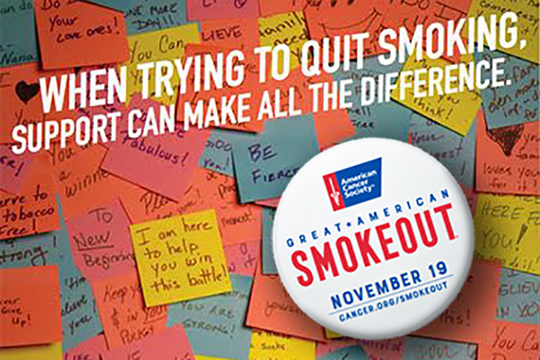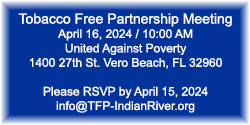News and Events
Tobacco Free Partnership Supports a Healthy Indian River
November 19, 2020
On November 19, 2020, the Tobacco Free Partnership of Indian River County participated in the annual Great American Smoke Out. The Partnership utilized this observance to encourage people to plan to quit smoking using the free tools and services available to Floridians.

Tracing its history back more than 40 years, the American Cancer Society's Great American Smokeout marks a date when smokers are encouraged to use the date to either make a plan or to begin their quit journey(1).
Quitting smoking can add up to 10 years to life expectancy(2). The health benefits of quitting smoking include reducing the risk of heart attack and stroke, improving lung function, and lowering the chances of getting an array of different cancers (3,4). The U.S. Centers for Disease Control and Prevention (CDC) adds that smoking may increase your risk of severe illness related to COVID-19(5).
In addition to a healthier body, quitting smoking can lead to a healthier wallet. One year after quitting smoking, a former pack-a-day smoker can save over $2,200, based on today's prices. Over five years, this adds up to a savings of over $11,000(6).
The Tobacco Free Partnership of Indian River County continues to provide access to information regarding free cessation resources. The Partnership partners with local businesses and organizations, such as Substance Awareness Center, Keeping the Arts Alive, and local medical providers to ensure all residents have access to free cessation resources.
With the new year approaching, employers across Indian River County utilize the Great American Smoke Out to support their employees' quit attempts. In addition to health benefits, businesses also stand to gain when employees quit.
A recent report found that an employee who uses tobacco can cost his or her company thousands of dollars each year in health costs, distraction at the worksite, increased medical costs, higher insurance, and other expenses(7). Employees who smoke are much more prone to absenteeism than those who don't, with even former smokers who quit within the last three years costing employers an average of $1,327.53 less each year(8).
The Tobacco Free Partnership is available to support businesses and organizations by promoting cessation resources and providing support to become a tobacco-free partner. If you or your organization are interested in supporting a healthy Indian River and want a chance to be featured in our next newsletter, contact Kyleigh Savoie at (772)-577-3701 or ksavoie@quitdoc.com
__________________________________________________________________
References:
- "History of the Great American Smokeout." American Cancer Society. https://www.cancer.org/healthy/stay-away-from-tobacco/great-american-smokeout/history-of-the-great-american-smokeout.html. [accessed 10 August 2020.]
- U.S. Department of Health and Human Services. The Health Consequences of Smoking—50 Years of Progress: A Report of the Surgeon General. Atlanta: U.S. Department of Health and Human Services, Centers for Disease Control and Prevention, National Center for Chronic Disease Prevention and Health Promotion, Office on Smoking and Health, 2014. [accessed 10 August 2020.]
- U.S. Department of Health and Human Services (USDHHS). (2014). Let's Make the Next Generation Tobacco-Free: Your Guide to the 50th Anniversary Surgeon General's Report on Smoking and Health (Consumer Booklet). Atlanta, GA: U.S. Department of Health and Human Services, Centers for Disease Control and Prevention, National Center for Chronic Disease Prevention and Health Promotion, Office on Smoking and Health. [accessed 10 August 2020.]
- U.S. Department of Health and Human Services. A Report of the Surgeon General. How Tobacco Smoke Causes Disease: What It Means to You. Atlanta: U.S. Department of Health and Human Services, Centers for Disease Control and Prevention, National Center for Chronic Disease Prevention and Health Promotion, Office on Smoking and Health, 2010 [accessed 2020 August 10].
- “Coronavirus Disease 2019 (COVID-19): People with Certain Medical Conditions. U.S. Centers for Disease Control and Prevention. https://www.cdc.gov/coronavirus/2019-ncov/need-extra-precautions/people-with-medical-conditions.html#smoking. [accessed 2020 August 27.]
- “State Excise and Sales Taxes Per Pack of Cigarettes Total Amounts & State Rankings.” Campaign for Tobacco-Free Kids. https://www.tobaccofreekids.org/assets/factsheets/0202.pdf [accessed 2020 August 10.]
- Berman, Micah & Crane, Rob & Seiber, Eric & Munur, Mehmet. (2013). Estimating the cost of a smoking employee. Tobacco control. 23. 10.1136/tobaccocontrol-2012-050888. [accessed 2020 August 12.]
- Baker, Christine L. JD, MPH; Bruno, Marianna PharmD, MPH; Emir, Birol PhD; Li, Vicky W. MPH; Goren, Amir PhD Smoking Cessation Is Associated With Lower Indirect Costs, Journal of Occupational and Environmental Medicine: June 2018 - Volume 60 - Issue 6 - p 490-495
doi: 10.1097/JOM.0000000000001302 [accessed 2020 August 10.]




